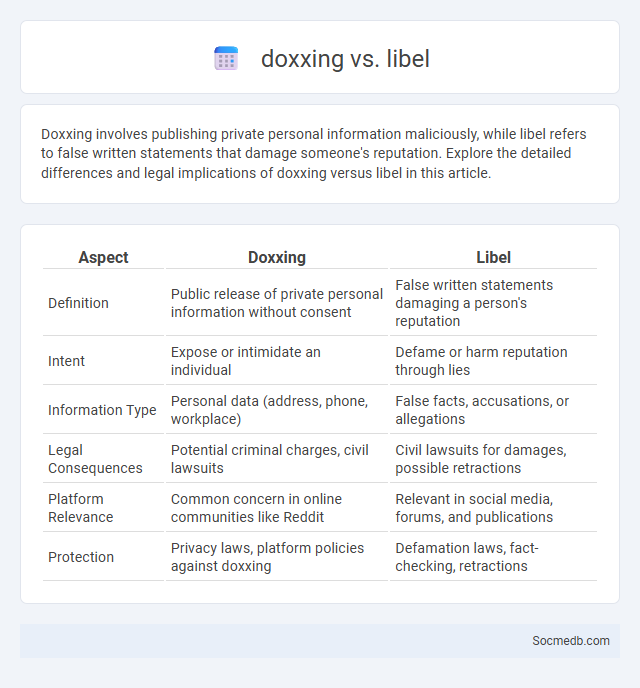
Photo illustration: doxxing vs libel
Doxxing involves publishing private personal information maliciously, while libel refers to false written statements that damage someone's reputation. Explore the detailed differences and legal implications of doxxing versus libel in this article.
Table of Comparison
| Aspect | Doxxing | Libel |
|---|---|---|
| Definition | Public release of private personal information without consent | False written statements damaging a person's reputation |
| Intent | Expose or intimidate an individual | Defame or harm reputation through lies |
| Information Type | Personal data (address, phone, workplace) | False facts, accusations, or allegations |
| Legal Consequences | Potential criminal charges, civil lawsuits | Civil lawsuits for damages, possible retractions |
| Platform Relevance | Common concern in online communities like Reddit | Relevant in social media, forums, and publications |
| Protection | Privacy laws, platform policies against doxxing | Defamation laws, fact-checking, retractions |
Understanding Doxxing: Definition and Consequences
Doxxing refers to the malicious act of publicly revealing someone's private information online without consent, often including addresses, phone numbers, or financial details. This breach of privacy can lead to severe consequences such as identity theft, harassment, and threats to personal safety. Social media platforms, being prime venues for doxxing incidents, emphasize the importance of user vigilance and robust privacy settings to mitigate risks.
What Constitutes Libel: Legal Perspective
Libel constitutes a false written statement published on social media that damages a person's reputation, meeting the legal criteria of defamation. To prove libel, the plaintiff must demonstrate that the statement is false, injurious, and made without adequate research into the truth. Legal frameworks vary, but social media posts are subject to the same libel laws as traditional media, emphasizing the importance of accuracy and intent when publishing content online.
Personal Information Doxxing: Scope and Risks
Personal information doxxing on social media involves the unauthorized release of sensitive data such as home addresses, phone numbers, and private emails, exposing individuals to threats like identity theft and harassment. The scope of doxxing spans various platforms, including Facebook, Twitter, and Instagram, where privacy settings are often insufficient to prevent data leaks. Risks associated with doxxing extend beyond online harassment, potentially leading to real-world dangers such as stalking, financial fraud, and emotional trauma.
Doxxing vs Libel: Key Differences Explained
Doxxing involves publicly revealing someone's private information online without consent, exposing them to harassment or harm, whereas libel refers to publishing false statements that damage a person's reputation. Your online safety depends on recognizing that doxxing violates privacy rights, while libel infringes on personal credibility through defamation. Understanding these distinctions is crucial for responsible social media use and legal protection.
Real-World Examples of Doxxing and Libel
Real-world examples of doxxing include the 2019 incident where journalist Caroline Criado Perez faced online harassment after advocating for women's images on British banknotes, resulting in her personal information being shared publicly. Libel cases such as the 2020 lawsuit against The New York Times for allegedly publishing defamatory statements highlight the legal consequences of false claims on social media platforms. Protecting your reputation requires understanding these risks and using privacy settings and verified sources to minimize exposure to harmful content.
Legal Ramifications: Doxxing, Libel, and Data Privacy Laws
Social media users face significant legal ramifications related to doxxing, libel, and data privacy laws, which protect individuals from unauthorized disclosure of personal information, defamation, and misuse of data. Understanding the legal boundaries helps you avoid severe penalties, including fines and criminal charges, while safeguarding your online presence. Compliance with platform policies and regional regulations, such as GDPR or CCPA, ensures responsible social media engagement and protects your digital rights.
Protecting Yourself: Steps to Prevent Doxxing and Libel
Protecting yourself on social media involves implementing strong privacy settings, regularly updating passwords, and being cautious about the personal information you share online. Using two-factor authentication and limiting friend or follower lists to trusted individuals can significantly reduce the risk of doxxing and libel attacks. Monitoring your online presence through alerts and promptly reporting any malicious content to platform administrators helps maintain digital security and reputation.
The Psychological Impact of Doxxing vs Libel
Doxxing exposes your personal information online, often causing anxiety, fear, and social isolation due to its invasive nature and potential physical threats. Libel involves false statements that damage your reputation, leading to emotional distress and loss of trust among peers and employers. Understanding the psychological impact of both is crucial for protecting your mental well-being and seeking appropriate legal support.
Social Media and the Spread of Personal Information
Social media platforms facilitate rapid sharing of personal information, increasing exposure to privacy risks and data breaches. Users often underestimate the permanence and reach of their posts, which can be exploited for identity theft, stalking, or targeted advertising. Awareness of privacy settings and cautious sharing practices are essential to protect sensitive personal data in the digital landscape.
Ethical and Societal Implications of Online Exposure
Social media platforms expose users to vast networks where personal information and behaviors are often publicly accessible, raising significant ethical concerns about privacy and consent. The pervasive nature of online exposure can lead to social consequences such as cyberbullying, identity theft, and mental health challenges related to self-esteem and comparison. Ensuring transparent data policies and promoting digital literacy are essential steps to mitigate these societal risks and foster responsible online engagement.
 socmedb.com
socmedb.com